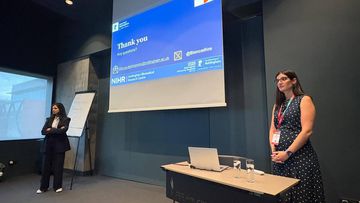Reset and Reform MS services: through workforce planning
NewsThe 'NHS Reset and Reform' report presents potential solutions to the challenges around workforce, capacity and funding, starkly shown in the data over the past few years, and compounded by the coronavirus pandemic.
There is a significant demand already being placed on multiple sclerosis (MS) services in the UK, with the understaffing across the NHS reflected in neurology services.
Growing caseloads owing to a lack of specialist staff and a rising MS population are exacerbated by the increasing numbers of disease-modifying treatments (DMTs) life-changing medicine which requires more intensive staff input for administration and monitoring.
Workforce pressures result in poorer quality of life for people with MS, and significantly higher costs to the NHS.
Earlier diagnosis and disease-modifying treatment (DMT) preserves brain function, delays disease progression and controls symptoms.
Shortage of MS specialists contributes to delayed diagnosis and access to treatment.
Suboptimal MS management leads to avoidable complications such as UTI, bladder, bowel and respiratory issues.
Healthcare professionals working in MS do not have the capacity to proactively manage patients to offer preventative care and management is reactive.
Positive workforce planning - really looking at the skills and abilities held within the broader picture of all local services, and utilising every person in every team effectively - can assist in switching to proactive, preventative care.
Dr David Paling, consultant neurologist at Sheffield Teaching Hospitals NHS Foundation Trust
Dr David Paling, consultant neurologist at Sheffield Teaching Hospitals NHS Foundation Trust, shares an example of how the neurology team in Sheffield is working closely with general practice through education and referral systems to optimise early diagnosis, support symptom management, and to triage people into sub specialty clinics where appropriate.
Whilst utilising skills held by non-specialists is essential to provide holistic, place-based care for people with MS, the importance of sufficient specialist posts cannot be under-estimated. Not only about commissioning and workforce planning, this is also about drawing professionals into the MS community, to specialise in the condition.
There is a considerable and unwarranted variance across the UK in the number of neurology registrars. To develop a comprehensive MS service for the future, we need an appropriate number of neurology trainees who are actively interested in MS and ready to engage with the challenges of running local MS services soon after their CCT.
Dr Riffat Tanveer, consultant neurologist
Dr Riffat Tanveer, consultant neurologist and MS MasterClass alumni won the runner up award at this year’s Raising the Bar meeting for his poster looking at neurology trainee’s views on taking on MS as a subspecialty. He shared the model of training he uses with registrars in his neurology department in a recent interview.
Riffat's research found that the most important factors to help registrars develop a subspecialty interest in MS were:
Having an enthusiastic and motivated MS consultant who will be their mentor during their rotation with the MS team to guide on professional development.
Incorporating the opportunity for trainees to attend, and participate in, MS multi-disciplinary meetings during training to better understand the complexities of choosing DMTs.
Discussion about research opportunities in MS.
To learn more about 'NHS Reset and Reform', read the written report here.
Thanks to our sponsor, Roche
The 'Reset and Reform' report has been sponsored by Roche Products Limited. Roche Products Limited has had no control over the educational content of this publication
Related articles
Encouraging excellence, developing leaders, inspiring change
MS Academy was established in 2016 and in that time has accomplished a huge amount with exciting feedback demonstrating delegates feel inspired and energised along their personal and service development journeys. The various different levels of specialist MS training we offer are dedicated to case-based learning and practical application of cutting edge research.


